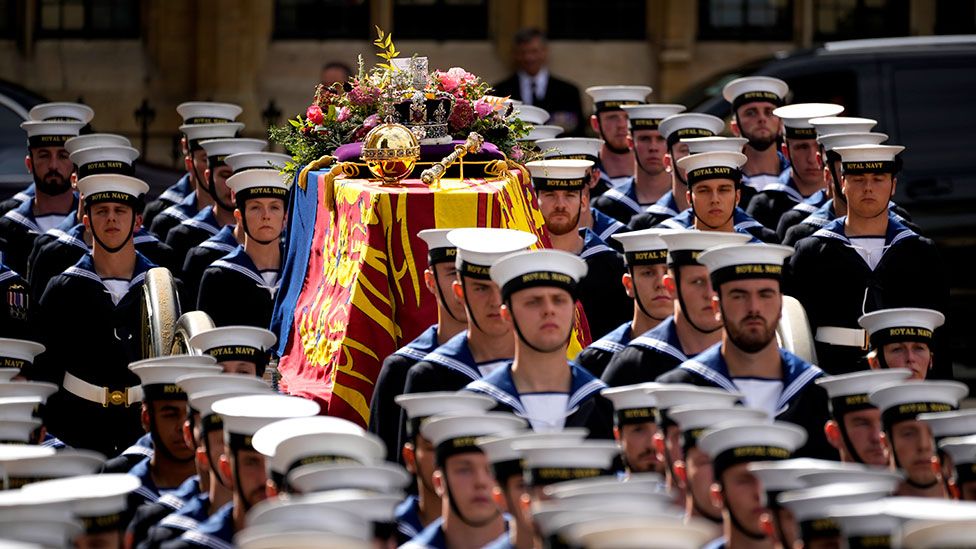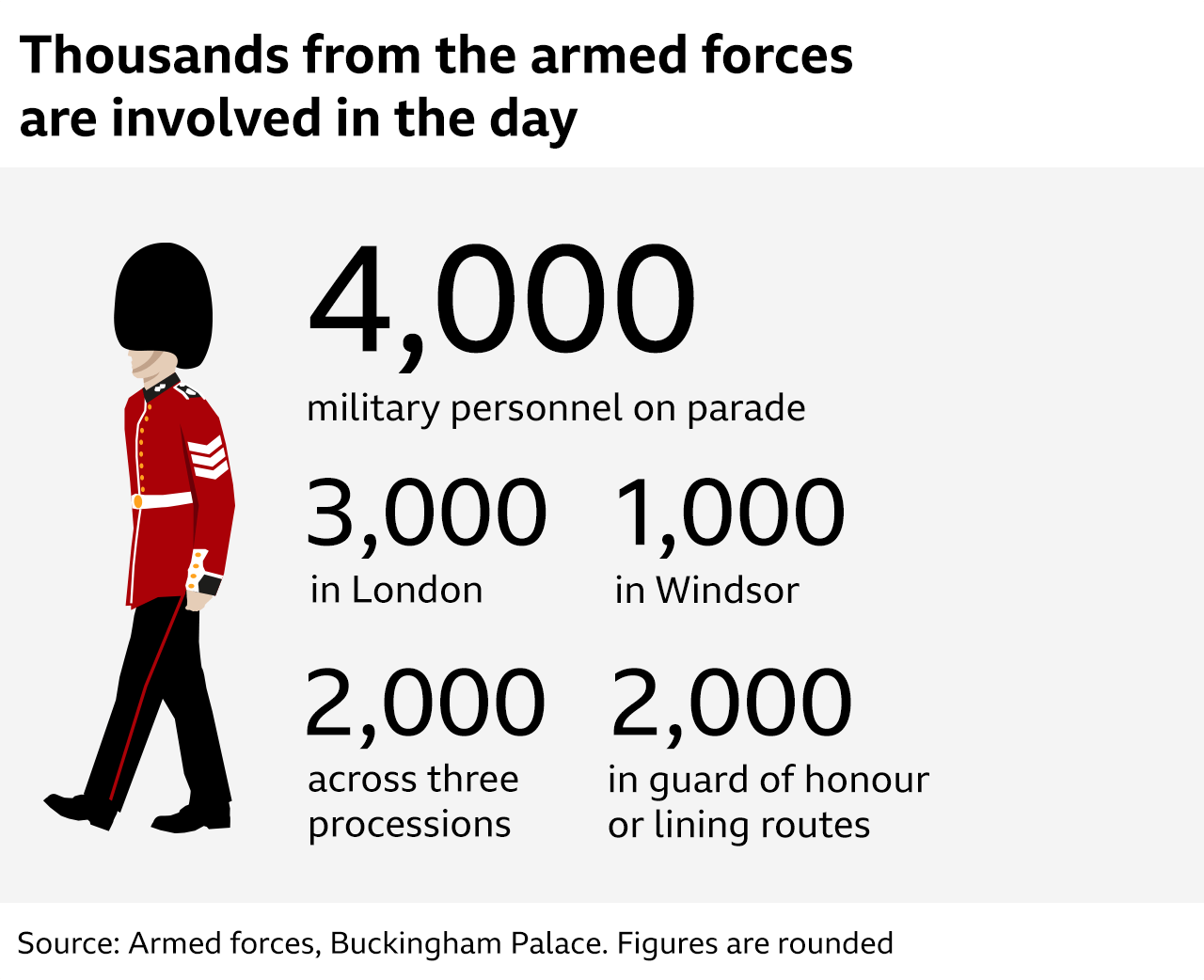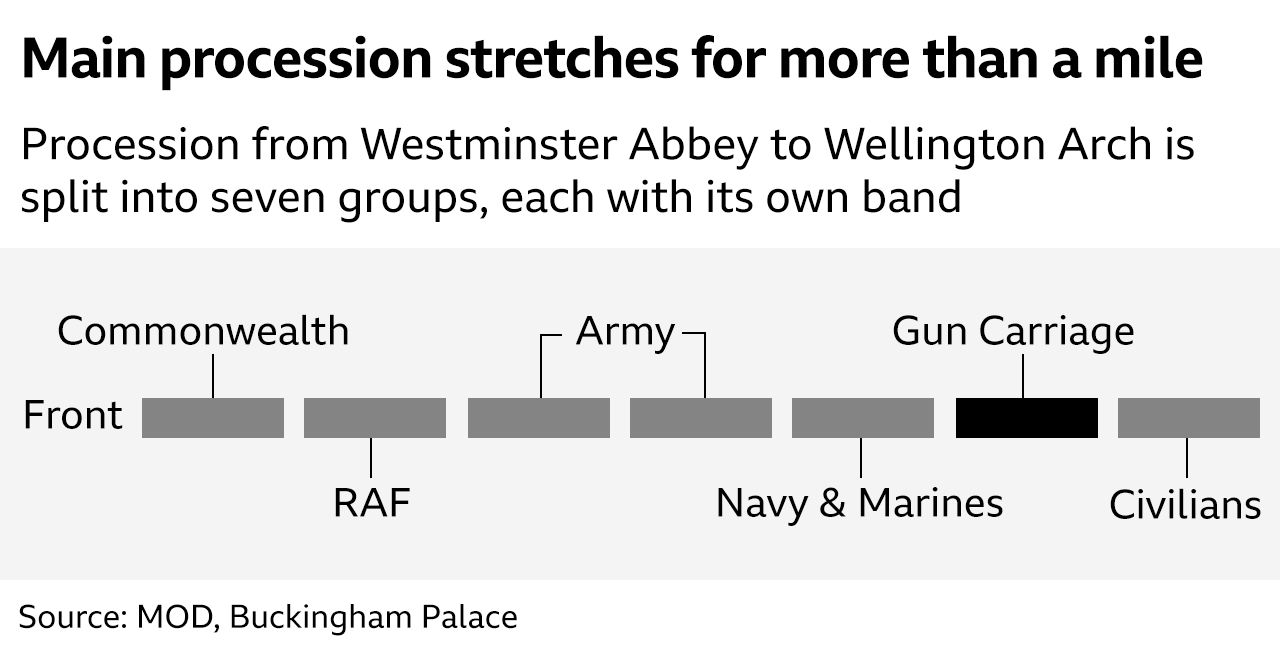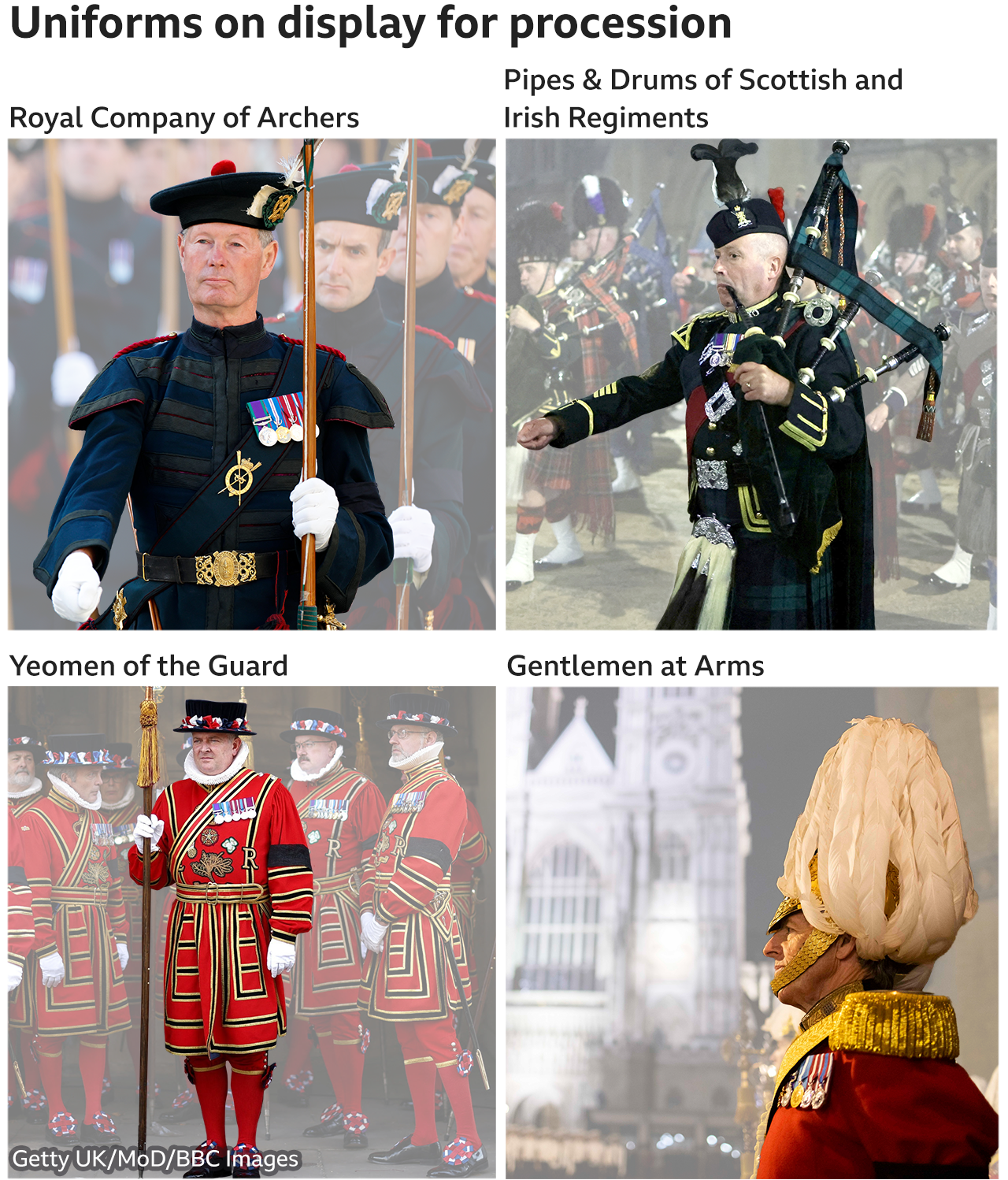Queen’s funeral: Gun carriage, Main procession
Newslooks- LONDON- BBC News

Thousands of members of the armed forces from the UK and abroad are taking part in the state funeral of Queen Elizabeth II – one of the grandest ceremonial events in living memory.
A procession involving the military, the Royal Family and those who have dedicated their lives to service of the Queen, is giving the late monarch a final farewell full of pomp and pageantry ahead of her burial in Windsor.
Here’s everything you need to know about the main funeral cortege.

Military personnel from the UK and the Commonwealth will be marching through London and Windsor. They’ll be taking part in the processions, lining the route, providing guards of honour or undertaking other ceremonial duties.
The Queen, who was head of the armed forces and served as their commander-in-chief, had a close personal relationship with the military and they will accompany her coffin in three processions on its journey through London to Windsor Castle – its final resting place.
The first, and shortest, carried her coffin to Westminster Abbey for the funeral service, the second is taking her from the Abbey to Wellington Arch ready for her road journey to Windsor. Once in Windsor, her coffin will join a third procession to St George’s Chapel in the castle’s grounds.
But the main focus is the journey through central London. The cortege, led by the Royal Canadian Mounted Police, is made up of seven groups, each with its own band. Members of the armed services from the UK and the Commonwealth, the police and the NHS are also involved. It left the Abbey just after midday and is expected to last about 45 minutes.

The Queen’s coffin, topped with the Royal Standard, the Imperial State Crown and the Sovereign’s orb and sceptre, is at the centre of the procession carried on the State Gun Carriage of the Royal Navy. The carriage was last seen in 1979 for the funeral of Prince Philip’s uncle, Lord Mountbatten, and was used for the Queen’s father, George VI, in 1952.
She is accompanied by the bearer party of the Grenadier Guards, the King’s Body Guards of the Honourable Corps of Gentlemen at Arms, the Yeomen of the Guard and the Royal Company of Archers.

Senior members of the Royal Family, including the new King and his sons Prince William and Prince Harry, are following behind.
They are joined by members of the Royal Household.
Camilla, the Queen Consort, the Princess of Wales, the Countess of Wessex and the Duchess of Sussex are following the procession in cars. Behind them are Princesses Beatrice and Eugenie, the daughters of the Prince Andrew.
The procession in full

Mounted Metropolitan Police • Royal Canadian Mounted Police • Bands of The Rifles and Brigade of Gurkhas • Representatives of the George Cross from Malta, the Royal Ulster Constabulary and the UK National Health Service
Representative detachments of Commonwealth forces: Territorial Air Force of New Zealand • Royal New Zealand Infantry Regiment • The Corps of Royal New Zealand Engineers • Royal New Zealand Armoured Corps • Royal Regiment of New Zealand Artillery • Royal New Zealand Navy • Royal Australian Air Force Reserve • Royal Australian Army Nursing Corps • Royal Australian Army Ordnance Corps • Royal Australian Infantry Corps • Royal Australian Engineers • Royal Regiment of Australian Artillery • Royal Australian Navy • The Canadian Armed Forces Legal Branch • The Royal Canadian Air Force (Reserve) • The Calgary Highlanders • The Argyll and Sutherland Highlanders of Canada • The 48th Highlanders of Canada • The North Shore (New Brunswick) Regiment • The Royal New Brunswick Regiment • Le Regiment de Ia Chaudière • The Stormont, Dundas and Glengarry Highlanders (Princess Louise’s) • The Canadian Grenadier Guards • Governor General’s Foot Guards • Royal 22e Regiment • The King’s Own Calgary Regiment (RCAC) The Governor General’s Horse Guards • The Royal Canadian Engineers • The Canadian Armed Forces Military Engineering Branch • The Royal Regiment of Canadian Artillery

Representatives of the Royal Air Force: 603 (City of Edinburgh) Squadron Royal Auxiliary Air Force • Royal Auxiliary Air Force • Royal Air Force Marham • The Combined Bands of the Royal Air Force • Royal Air Force College, Cranwell • Royal Air Force Regiment

Representatives of the Army: The Honourable Artillery Company • Adjutant General’s Corps • British Army Bands Sandhurst and Colchester • The Queen’s Gurkha Engineers • The Royal Welsh • The Duke of Lancaster’s Regiment • The Royal Regiment of Scotland • Welsh Guards • Irish Guards • Scots Guards • Coldstream Guards • Grenadier Guards • Bands of the Irish Guards and Welsh Guards • Corps of Royal Engineers • Royal Regiment of Artillery • Royal Tank Regiment • The Royal Lancers • The Royal Scots Dragoon Guards (Carabiniers and Greys)

Representatives of the Royal Navy: Royal Marines Reserve • Royal Naval Reserve • Royal Marines • Royal Navy • Bands of the Royal Marines
Defence advisers and staff of Her Majesty’s realms: New Zealand • Australia • Canada
Representative colonels of Commonwealth forces of which Her Majesty was Colonel-in-Chief
Chaplains of the armed forces: Principal Church of Scotland & Free Church Chaplain Royal Air Force • Principal Roman Catholic Chaplain Royal Air Force • Chaplain-in-Chief Royal Air Force • Deputy Chaplain General (Army) • Principal Roman Catholic Chaplain (Army) • Chaplain General (Army) • Principal Church of Scotland and Free Churches Chaplain (Royal Navy) • Principal Roman Catholic Chaplain (Royal Navy) • Chaplain of the Fleet
Representatives of forces of which the Queen was air commodore-in-chief • Representative Colonels Commandant, Colonels and Honorary Colonels of Her Majesty’s Regiments and Corps • Commandant General, Royal Marines • Representatives of Her Majesty’s ships • Commander Strategic Command • Vice Chief of the Defence Staff • Chief of the Air Staff • Chief of the General Staff • Chief of the Naval Staff • Chief of the Defence Staff • Drum Horse and State Trumpeter • 1st Division of the Sovereign’s Escort • ADC to the Major General Commanding the Household Division • Brigade Major Household Division • Major General Commanding the Household Division • Combined Bands of the Scots Guards and Coldstream Guards
Pursuivants and Heralds of Arms of Scotland: March • Linlithgow • Ormond • Rothesay • Falkland • Unicorn • Carrick • Marchmont
Pursuivants and Heralds of Arms of England: Portcullis • Rouge Dragon • Norfolk • Windsor • York • Bluemantle • Wales • Maltravers • Chester • Richmond
Kings of Arms: Norroy and Ulster King of Arms • Lord Lyon King of Arms • Clarenceux King of Arms • Lady Usher of the Black Rod • Garter King of Arms
The Earl Marshal • Bands of the Scots Guards and Coldstream Guards • Captain, the King’s Body Guard of the Yeoman of the Guard • Captain general, the King’s Body Guard for Scotland (Royal Company of Archers) (Gold Stick for Scotland) • Captain, His Majesty’s Body Guard of the Honourable Corps of Gentlemen at Arms
Royal Household; Vice Chamberlain of the Household • Comptroller of the Household • Treasurer of the Household • Queen’s Gurkha Orderly Officer (x2) • Royal Waterman (x2) • Master of the Horse • Lord Steward • Director of the Royal Collection • Comptroller Lord Chamberlain’s Office • Master of the Household • Keeper of the Privy Purse • Private secretary to the Queen • Deputy private secretary (x2) • Queen’s Page (x2) • Palace Steward


Behind the gun carriage:
Escort Party of the Household Cavalry: Escort Commander • Field Officer of the Escort • Standard Coverer • Sovereign’s Standard of the Royal Navy • Trumpeter
Royal Family: The Earl of Wessex and Forfar • The Duke of York • The Princess Royal • The King • Peter Phillips • The Duke of Sussex • The Prince of Wales • Vice Admiral Sir Tim Laurence • The Duke of Gloucester • The Earl of Snowdon
Royal Car 1: The Queen Consort • The Princess of Wales
Royal Car 2: The Duchess of Sussex • The Countess of Wessex and Forfar
Royal Car 3: Princess Beatrice • Princess Eugenie
Field officer in Brigade Waiting • Silver Stick in Waiting • Colonel Coldstream Guards • Gold Stick in Waiting • Adjutant in Brigade Waiting • Silver Stick Adjutant • Crown Equerry
Household of the former Prince of Wales and Duchess of Cornwall: Private secretary • Principal Private Secretary • Equerry (x2) • Master of the Household

Second division of the Sovereign’s escort
Representatives of Civilian Services: Merchant Navy • Royal Fleet Auxiliary • The Maritime Coastguard Agency • Police Services • Fire and Rescue Services • His Majesty’s Prison Services • Ambulance Service • British Red Cross • St John Ambulance • Royal Voluntary Service • Cadet forces
Rear: Band of the Royal Marines • Royal Mews Car • Mounted Metropolitan Police
Source: Buckingham Palace, the armed forces

Once the procession reaches Wellington Arch at Hyde Park Corner, at about 13:00 BST, the coffin will be transferred to the new State Hearse for its final journey to Windsor Castle.
Just after 15:00 BST, the hearse is expected to arrive for a walking procession up Windsor Castle’s Long Walk. The three-mile (5km) avenue will be lined with members of the armed forces.
The King and senior members of the Royal Family are expected to join the cortege in the Quadrangle in Windsor Castle a little later ready for the committal service and later burial at St George’s Chapel.







